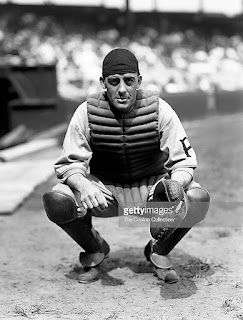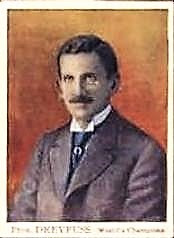- 1861 - OF James “Ren” (Renwick was his middle name) Wylie was born in Elizabeth. His moment of baseball glory happened on August 20th, 1882 when the 20-year-old center fielder from Geneva College played in his only MLB game, going 0-for-3 for the Alleghenys. He went on to bigger and better things, becoming a successful banker, realtor and two-time Pennsylvania State Representative.
 |
| Charlie Hargreaves - 1924 photo Conlon/Rogers/Getty |
- 1896 - C Charlie Hargreaves was born in Trenton, New Jersey. He caught for Pittsburgh at the end of his career from 1928-30, and was a solid two-way guy for the first two seasons before fading in 1930, putting up a .273 BA over that period. Charlie rejoined the organization briefly, managing the Bucs’ Class C Keokuk Pirates squad of the Central Association in 1949.
- 1898 - 2B Henry “Heinie” Reitz was traded by the Washington Senators to the Pirates for OF/3B Jack O'Brien, IF Dick Padden and OF Jimmy “Rabbit” Slagle. It wasn’t a very good deal for Pittsburgh; Reitz played 35 games and was traded at the end of the 1899 season. O’Brien was a journeyman, Padden had three solid seasons remaining, and rookie Slagle went on to have a 10-year career, mainly with the Cubs, and a lifetime .268 BA. “Heinie” was a popular nickname for German baseball players, particularly those named Henry, or Heinrich in German.
- 1909 - Pittsburgh purchased 1B John Flynn from St. Paul of the American Association for $4,000. He was solid in 1911, batting .274 in 96 games, but fizzled the following campaign and was sent back to the Paulies. They flipped him to Washington, where he played his last 20 MLB games in 1920.
- 1911 - Pirate owner Barney Dreyfuss proposed that each team in the World Series turn over 1/4 of its share of the gate to the league, to be divided among the other teams. It began changes that ultimately gave players of the top four finishers in each league a share of the World Series money. Dreyfuss actually added his owner’s cut of the 1903 World Series gate receipts to the players' share, so the Pirates earned a larger payout than the winning Boston team that year.
 |
| Barney shared with the boys - 1910 Tip Top |
- 1918 - RHP Willie Pope was born in Birmingham and raised in Library, just outside South Park. A 6’4’ hurler known as “Wee Willie,” Pope began his career as a pitcher with the Pittsburgh Crawfords in 1946 but was mostly known for playing with the Grays during the 1947-48 seasons. During the 1947 campaign, the righty notched a 6-7 record, but pitched a no-hitter against the New York Cubans. In the 1948 season, he was a major contributor to the Grays team that won the last Negro National League Pennant and won the Negro Leagues World Series against the Birmingham Black Barons of the Negro American League. He played a couple of years in the minors while his brother Dave played for Cleveland and Baltimore. Willie remained in the City after his career as a player in Pittsburgh ward politics and a local black baseball historian. He passed away in 2010 at the age of 91.
- 1922 - In what looked like a big deal at the time, the Bucs sent RHPs Chief Yellow Horse & Bill Hughes, minor leaguers Harry Brown & Claude Rohwer, and $7,500 to Sacramento of the Pacific Coast League for RHP Earl Kunz. The Chief and Hughes never pitched big league ball again, Brown and Rowher proved to be career farm hands, and the 23-year-old Kunz went 1-2/5.52 during 1923 in his only major league campaign.
- 1923 - LHP Paul “Lefty” LaPalme was born in Springfield, Massachusetts. Lefty began his career in Pittsburgh (1951-54) and was a starter in the last two seasons, with a Pirate line of 14-33-2/4.99. The knuckleballer was traded to the Cards in 1955, converted to a reliever, and put together solid seasons from the pen through the 1957 campaign.
- 1927 - The Pirates waived four-year man LHP Emil Yde and three-year vet C Roy Spencer to Indianapolis; they were to receive a PTBNL, whose name never made the record books. Yde had won 41 games in his first three Pirates campaigns, but fell apart in ‘27, giving up 35 runs (32 earned) in 29-1/3IP. He had a last hurrah in 1929 with the Tigers, going 7-3 but with a 5.30 ERA to close out his MLB career. Spencer hung around for nine more big league seasons, getting regular time in the early thirties with Washington and Cleveland, before retiring the mask.
- 1943 - C Jerry May was born in Staunton, Virginia. May was mainly a backup catcher from 1964-70 (he started in ‘67-68) for the Bucs, hitting .237 in his seven year Pittsburgh stint. He was signed by Syd Thrift out of high school and tossed several no-hitters as an American Legion pitcher; the Bucs converted him to catcher and he was behind the dish for Dock Ellis’ infamous 1970 no-hitter. May was bumped out of the starting role by Manny Sanguillen. Jerry was a good tactician and glove guy throughout his 10 year MLB career, throwing out 43% of the base runners who tried to steal a sack on him, good for 11th on the all-time list. He led NL catchers in 1970 with a 50% caught stealing percentage.

2 comments:
I didn't realize that Jerry May was that good with his defense. Thanks for the recap of his career. It occurs to me that most of what I have read about Sanguillen has to do with his good hitting rather than his glovework. How did Manny compare with Jerry?
To be honest, Wil, I don't remember that much about May except he was the guy Manny beat out for the C spot. Manny was pretty good defensively - he had a 39% throw-out rate, and as I recall, was pretty agile at blocking balls and hung tough on the plays at the plate. The one rap I remember was that he sometimes had trouble, not in calling a game (he was pretty good at that by most reports), but in communicating with pitchers early in his career because his English was a work in progress, but that improved enough over time to become a non-issue. Of course, his rep was always second to Bench, but Manny was a pretty good all-around guy with his mitt behind the dish.
Post a Comment